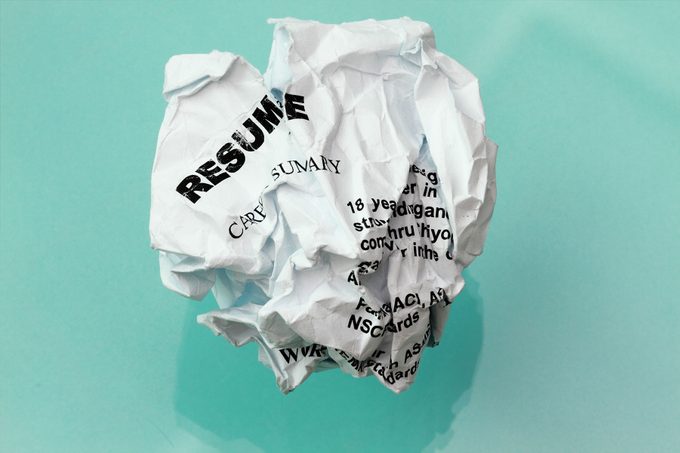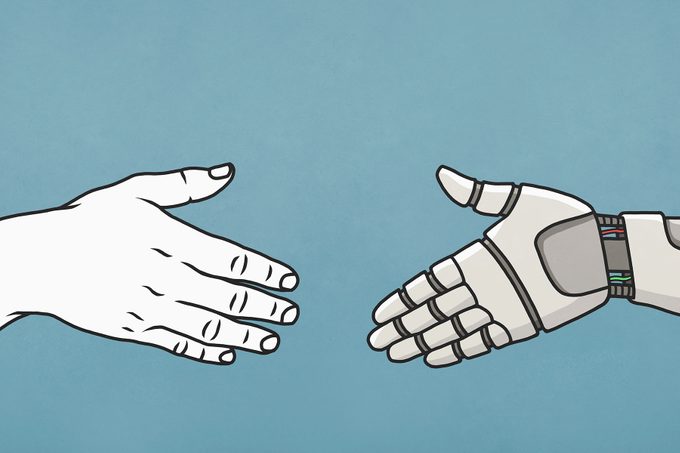5 Résumé Mistakes You’re Making That’ll Land You in the AI Black Hole
Updated: Nov. 23, 2023

Most résumés today are filtered by algorithms, not humans. Here's how to navigate the AI résumé reader.
While avoiding common résumé mistakes and deciding what to put and what not to put on your résumé, don’t overlook the fact that the first “eyes” on your résumé don’t always belong to a human. Those “eyes” are likely to be part of an algorithm that filters résumés for relevance. If you want to craft a winning résumé that lands you the job, you have to be aware of what AI will pick up on and what résumé mistakes will land you in the AI black hole. You can also use AI to seek the career opportunities best suited for you.
“When used as a tool, AI can allow older job seekers to leverage their experience,” says Mauro F. Guillén, Dean of the Cambridge Judge Business School and author of The Perennials: The Megatrends Creating a Postgenerational Society. “When crafting a résumé or CV, job seekers should emphasize their ability to adopt a 360-degree view based on their experience,” Guillén says. “This is especially true of older workers, who have the opportunity to benefit disproportionately from AI when used correctly. Understanding how the technology works will be critical for both the application process and for the future of work.”
The line between asking AI to help us write our résumés and AI throwing our résumés in the trash is a fine one. Here are five résumé mistakes that’ll land you in the AI black hole.
Trying to game the system with keyword stuffing

It’s wise to use phrasing from the job posting in your résumé, because that’s how the company knows if you’re a good fit. “AI or not, hiring managers are looking for résumés that align with their company’s needs and will be screening for keywords,” says Akhila Satish, an award-winning career expert, scientist and the CEO of Meseekna, where she’s worked with employers such as the U.S. Department of Defense, NASA, Eli Lilly and Credit Suisse to assess and improve employee performance.
That said, it’s possible to go overboard with the keywords, and one so-called trick that some people think is clever may get your résumé tossed out. “Don’t try to be sneaky by pasting the entire job description into your résumé and trying to hide it in four-point white font,” says certified résumé writer Kelly Donovan, principal of Kelly Donovan & Associates, a firm that works with job seekers nationwide. “An HR rep will quickly figure out what you did and will NOT be impressed.”
Keywords are critical, though they must be used carefully. “Adjust your language to match the keywords and phrases in the job description,” Donovan advises. “The software won’t necessarily recognize synonyms.” Donovan also reminds job seekers that software is looking for standard headings like “Experience” and “Education,” so don’t get creative with unusual headings like “Professional History” and “Academic Achievement.”
Using text boxes and fancy formatting
What might look snazzy in print is often lost in digital translation and can even be entirely overlooked by AI. “Avoid putting critical information in text boxes, and save your infographic-style résumé for face-to-face networking,” Donovan advises. She also points out that “not all software can properly read the contents of the header and footer fields, so don’t put your contact information or other crucial details there.”
Losing your integrity
Don’t get so focused on including the right keywords that you lose sight of what wording accurately represents you and your experience. “Remember that even if you’re trying to navigate around AI, you’re not helping yourself or a hiring manager if you’re not giving an honest picture of who you are and what you bring to the table on your résumé,” Satish says. “Your résumé may surpass AI if you’re fluffing it up, but it’s not worth risking a hiring manager’s time or your own if you’re embellishing your résumé for the sake of AI.”
Including your address
It used to be standard to put your address on the top of your résumé, but Satish says you should reconsider including it now. “Remote roles aren’t going anywhere,” she says, “but you may want to think twice before including your address on a résumé, even if it’s a remote position,” Satish says. “AI might immediately rule you out if it seems like you’re not located near company leadership, and it’s best to have those conversations about your expectations for in-person work or possible relocation with a real human.”
Forgetting to be human

While AI is an excellent tool for job seekers (and hiring managers!) and can help you create a great résumé that highlights the skills recruiters are looking for, it’s not perfect and makes mistakes. “You should always review and edit your résumé before sending it off,” Satish says. “You’re more likely to account for any computer-made errors, since AI is not immune to misinformation (and not so great with grammar yet, either!) that may send you into the AI black hole.”
Satish also reminds you to be a human and to connect with humans. “Supplement your résumé with networking and make sure that a real human is looking for your application before AI rules you out,” she says.
About the experts
- Mauro F. Guillén is Dean of the Cambridge Judge Business School and author of The Perennials: The Megatrends Creating a Postgenerational Society.
- Akhila Satish is an award-winning career expert, scientist and the CEO of career development and training company Meseekna, where she’s worked with the U.S. Department of Defense, NASA, Eli Lilly and Credit Suisse to assess and improve employee performance.
- Kelly Donovan, an executive résumé writer, LinkedIn specialist and job search coach, is the principal of Kelly Donovan & Associates, a consulting firm that works with job seekers nationwide.
